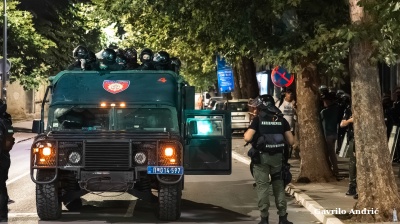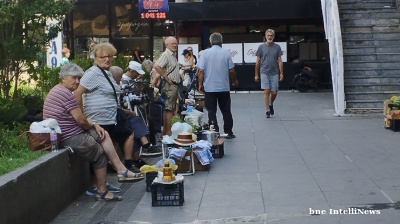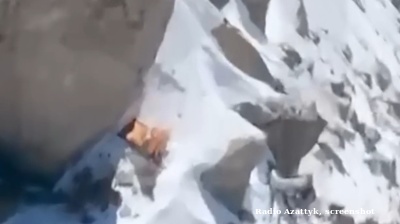Western unity to support Ukraine in its existential struggle with Russia has collapsedю The G7 summit of the world’s richest nations in Canada, broke up on June 17 without releasing a joint statement condemning Russia’s military occupation of Ukraine. Efforts to force peace talks on Russian President Vladimir Putin are dead in the water, despite the most extreme sanctions regime in history.
Like the “coalition of the willing", which has become a subgroup in Europe supporting Ukraine, the G7 has now also been downgraded to the G6 of richest countries minus America. The G7 summit should have been the venue to rally Western support one last time to turn the screws tight enough to force Russian President Vladimir Putin to the negotiating table but US President Donald Trump refused to even broach the topic and left early.
At the meeting in Kananaskis, in the Canadian Rockies in Alberta, Trump refused to sign a declaration that contained strong language condemning Russia’s invasion of Ukraine more than three years ago. Indeed, since taking office at the start of this year, the Trump administration has imposed no new sanctions whatsoever, nor pledged more than $50mn of new weapons supplies.
The only new US sanctions in the pipeline is a bill sponsored by Senator Lindsey Graham that would impose “bone crushing” 500% tariffs on any country that buys Russian oil that would affect India and China the most as Russia’s main customers. However, as bne IntelliNews reported, this plan is unworkable and would result in little more than isolating the US further and causing a major energy crisis.
The US has also not allocated any new military assistance, dropping the entire Ukraine issue in Europe’s lap. At the recent Ramstein conference of Western military leaders, Europe committed to a new record €1.3bn package of military support. However, US Secretary for Defence Pete Hegseth failed to attend the meeting, sending a deputy in his place, and the US committed exactly nothing to the new package. US participation is important, not just for the money, but it is also the source of military hardware and things like satellite intelligence that Europe can’t provide on its own.
Trump didn’t even stick around for the final press conference, leaving the summit early, blaming pressures from the escalating war between the US-backed Israel and Iran in the Middle East.
In an attempt at a face-saving compromise, the host of the conference, Canadian Prime Minister Mark Carney, issued his own statement, “the chairman’s summary”.
The West showed exceptional unity in the first week after the Russian invasion of Ukraine, immediately imposing crushing sanctions including freezing some $300bn of Russian reserve money held in Western banks and banning Russian banks from the SWIFT bank messaging service. The EU and the US were united by the slogan, “Stand with Ukraine for as long as it takes.” But since then, the unity has steadily crumbled as national interests came to play an increasingly important role, undermining Western commitment to supporting Ukraine.
US support faltering
The US enthusiasm for supporting Ukraine already began to fade two years ago, when US President Joe Biden watered down US commitment from “as long as it takes” to “as long as we can” in December 2023. That was followed by a funding crisis after the US ran out of money for Ukraine and stopped supplying it completely, leaving the skies open to a massive barrage that started in March 2023 by Russia that has destroyed almost all of Ukraine’s non-nuclear power generation capacity.
Ukraine was rescued with a new $61bn aid package that April that restarted the flow of money and weapons, but last year Ukrainian President Volodymyr Zelenskiy complained that of the promised money less than half was actually delivered, with the rest tied up by partisan bickering in the US Congress. This spring Ukraine finds itself in the same position as US support dries up again and Russia repeated its tactic of attempting to run down Ukraine’s supply of air defence ammo with another devastating missile barrage over the weekend of May 23 – an assault that is ongoing.
As the chart shows, US support for Ukraine already fell off to next to nothing at the end of 2024 under the Biden administration and the Trump administration has made no new commitments to Ukraine and is very unlikely to do so, leaving the G6 group, everyone except the US, to step into the breach with a G7 $50bn loan to Ukraine, approved on June 13, 2024 at the last G7 summit in Italy. Ukraine continues to get some $1bn a month from this facility and thanks to the departing largess of the Biden administration remains well funded for the rest of this year at least.

CoW4
After taking office Trump attempted to bring Putin and Zelenskiy together in a deal with ceasefire talks that kicked off in Riyadh on February 18 without success. Trump made many concessions to Putin’s demands for a conditional ceasefire, including offering significant sanctions relief, rejecting the call for an unconditional ceasefire. The negotiations came to a head at a meeting in London with Trump’s “final offer” that was rejected by Zelenskiy, who made a counteroffer in the last week of April that started with no new talks until an unconditional 30-day ceasefire is in place. The two sides are now deadlocked, and no progress has been made since then.
Zelenskiy rejected the deal as it would have seen Ukraine concede sovereignty over the five regions occupied by the Armed Forces of Russia (AFR) among other things, which is a red line for Bankova (Ukraine’s equivalent of the Kremlin).
Since then the job of supporting Ukraine has been taken over by the top four leaders of the coalition of the willing (CoW4) – Polish Prime Minister Donald Tusk, French President Emmanuel Macron, UK Prime Minister Keir Starmer and the newly installed German Chancellor Friedrich Merz -- but this group too is a deterioration of the unity amongst EU states, as it notable does not include EU member states like Hungary and Slovakia that are actively blocking more sanctions and Ukraine’s membership of the EU in exchange for concessions to allow continued imports of Russian energy.
Indeed, the EU is in danger of breaking up as it is increasingly torn by internal divisions thanks to the rise of populist right-wing and pro-Russian parties. Hungarian Prime Minister Viktor Orban is the focal point of this group and supported by Slovak Prime Minister Robert Fico. A new right-leaning government in Austria led by Christian Stocker was elected in March and the right-wing President Karol Nawrocki was narrowly elected in Poland this month. Germany was rocked by the electoral success of the far-right AfD (Alternative für Deutschland) in elections in May, which in the meantime has overtaken the ruling CDU to become the most popular party in Germany and is also pro-Russia.
Orban has been building the EU parliamentary group “Patriots for Europe” that is pro-Russian and started building a non-EU military alliance with agreements with the pro-Russia Serbian President Aleksander Vucic, amongst other things.
Brussels has been put in the difficult position of trying to accelerate Ukraine’s EU accession in the face of Orban’s increasingly vigorous campaign to block its ascendancy. And even Poland, nominally a Ukrainian supporter, has blocked the extension of an exemption on import duties to the EU as they threaten Poland’s own agricultural sector. EU foreign policy chief and former Estonian Prime Minister Kaja Kallas has been desperately looking for a work around, a “Plan B”, to Hungary’s de facto veto over Ukraine’s accession to the EU that includes possibly stripping Hungary of its voting rights in the European Parliament.
Wooing Trump
The European leaders were actively lobbying Trump in Alberta, showering the famously fickle president with kitschy gifts and praise, trying to keep him in the coalition against Russia with little success.
The Portugal-born European Council President António Costa gave Trump a football jersey signed by Portuguese megastar Cristiano Ronaldo. Previously, German Chancellor Friedrich Merz presented Trump with a copy of his German grandfather’s birth certificate at their last meeting. And everyone has heaped Trump with flattering praise, playing to his notorious large ego, while scrupulously avoiding direct criticism of the mercurial leader.
At a press conference after the summit, Carney was asked whether the US was the reason there was no official joint declaration on Ukraine, Politico reports.
"There was no problem at all," Carney said playing down the obvious failure to produce any substantial result at the summit, adding all G7 leaders had agreed on wording on the war in Ukraine at a working dinner Monday night — before "certain tragic events" in the Middle East meant "it was more important, if you like, for us to have a G7 declaration on the situation in Iran."
"The language that's in my declaration" was agreed "directly with President Trump," meaning there was "consensus around that language," Carney stated. However, Trump refused to condone a statement criticising Russia, leaving that statement to Carney’s own statement.
“G7 Leaders expressed support for President Trump’s efforts to achieve a just and lasting peace in Ukraine. They recognized that Ukraine has committed to an unconditional ceasefire, and they agreed that Russia must do the same. G7 Leaders are resolute in exploring all options to maximize pressure on Russia, including financial sanctions,” Carney’s statement said, adding a similar statement condemning the outbreak of war in the Middle East.
The only concrete decisions reached by the summit were all of secondary important and according to Carney’s statement included:
-Securing high-standard critical mineral supply chains that power the economies of the future.
-Driving secure, responsible and trustworthy AI adoption across public and private sectors, powering AI now and into the future, and closing digital divides.
-Boosting cooperation to unlock the full potential of quantum technology to grow economies, solve global challenges and keep communities secure.
-Mounting a multilateral effort to better prevent, fight and recover from wildfires, which are on the rise around the world.
-Protecting the rights of everyone in society, and the fundamental principle of state sovereignty, by continuing to combat foreign interference, with a focus on transnational repression.
-Countering migrant smuggling by dismantling transnational organized crime groups.
Efforts to persuade Trump to beef up US sanctions also went nowhere. The EU recently passed its seventeenth sanctions package and is due to approve an eighteenth package in the next week. The keystone sanction in the new package will be to decrease the oil price cap to $45. The G6 leaders were pressuring Trump to support the plan, but despite some tough talk, Trump has no interest in imposing any new sanctions and is fully focused on his Liberation Day tariff regime instead.
As bne IntelliNews has reported, oil sanctions have failed and not a single barrel of Russian crude oil has been sold below the oil price cap of $60. Likewise, technology sanctions have also largely failed, as Russia found alternative suppliers or imported what it needed from the West via third parties. Under Biden, the US did impose some effective sanctions, the so-called strangulation sanctions and financial sanctions that caused Turkish and Chinese banks to pull out of Russia in 2024. But there has been no talk of expanding these sanctions by the Trump administration.
The UK and EU leaders said at the summit they will move ahead with their campaign to lower the maximum price Russia can sell oil for on their own, but British Prime Minister Keir Starmer admitted that would be easier said than done. "Obviously, we're still looking at how we're going to make that work. But I strongly believe that we have to put those sanctions in place,” Starmer said.
Despite the failure of the G7 summit, the European leaders haven’t entirely given up hope as for Ukraine to perceive in the war it will need sophisticated weaponry that only the US can supply. European Commission President Ursula von der Leyen launched the €150bn ReArm programme in March to bring Europe’s defence sector up to scratch and replace its dependency on the US for security, but this effort is likely to take years.
Merz said he remains “cautiously optimistic” that Washington would eventually come round to supporting Ukraine and “ultimately adopt stronger sanctions against Russia," echoing an earlier statement by French President Emmanuel Macron.
In the meantime, on the table to keep Ukraine in the game is a plan where Kyiv buys its weapons from the US, rather than receiving them as gifts, and that the EU help’s Kyiv fund these purchases, a plan Zelenskiy says is currently being discussed with Brussels.
Features

South Korea, the US come together on nuclear deals
South Korean and US companies have signed agreements to advance nuclear energy projects, aiming to meet rising data centre power demands, support AI growth, and strengthen the US nuclear fuel supply chain.

World Bank seems to be having second thoughts about Tajikistan’s Rogun Dam
Ball now in Dushanbe’s court to justify high cost.

INTERVIEW: From cinema to Serbian police cell in one unlucky “take”
An Italian software engineer caught in Belgrade’s August protests recounts a night of mistaken arrest and police violence in the city’s tense political climate.
_Cropped_1756210594.jpg)
Turkey breaks ground on its section of the TRIPP rail corridor
Turkish project would help make TRIPP the go-to route for Middle Corridor freight.




_1756222537.jpg)